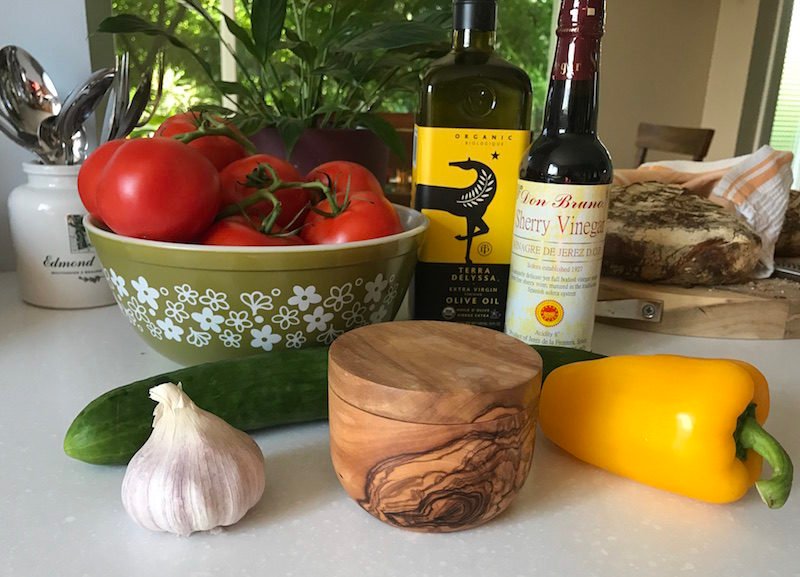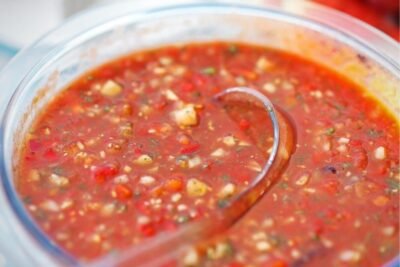
I was first inspired to make gazpacho by an interview with Penelope Cruz in InStyle magazine, of all places, back in 2014. (“In Spain we eat gazpacho almost every day, so you get a lot of vegetables in a way that is very delicious.”) I had sort of avoided gazpacho up to that point,* but I also had a mountain of ripe tomatoes in my garden to use up. I was getting tired of spending hours cooking them down into tomato sauce, and wanted something quick, easy and delicious!
(*My first encounter with gazpacho was in the dorm cafeteria during undergrad at University of Oregon many moons ago. I thought “how weird” and steered clear. Somehow, the discordance of seeing what, when done well, is a light, fresh, lovely dish in a dorm cafeteria made me continue to avoid gazpacho for many, many years.)
I did a web search for recipes, which vary widely. (Some use mostly tomato juice, which was NOT what I had in mind.) I combined characteristics of a few different recipes to come up with this little winner. It was super easy, super tasty, and husband-approved. (That’s significant, since he wasn’t so sure about the idea of a cold soup.)
Why this recipe is great
Much like ratatouille (recipe coming soon!), gazpacho inexplicably fell out of favor after a few intense years. Seriously, I have no idea why. I’ve also used purchased tomatoes to make this fresh, lovely, easy soup. Homegrown or no, I truly appreciate the fact that this soup starts out cold and stays cold, with no cooking in between.
I’ll be enjoying my gazpacho this summer even though I now live in a house with central air-conditioning, but it really came in handy it when I lived in a cute older home with no central A/C, it was 90-thousand degrees outside, and my kitchen was hot enough without turning on the stove or oven!

Rustic Gazpacho
Ingredients
- 3 pounds ripe tomatoes, cut into large chunks
- 1 large cucumber, peeled, halved, seeded (only if seeds are large) and cut into chunks
- 1 yellow bell pepper, de-stemmed, seeded and cut into chunks
- 2 garlic cloves, peeled and crushed
- 1/2 cup extra virgin olive oil
- 2 tablespoons sherry vinegar
- 1 cup water (you can use less if you want a thicker soup)
- 1 large slice stale rustic bread
- 1/2-1 teaspoon ground cumin
- Salt, to taste
- Dried ground red pepper or hot sauce, to taste
Optional
- Finely diced cucumber, thinly sliced scallions (green onions) and/or chopped Italian (flat-leaf) parsley for garnish
Instructions
- Tear the bread into large chunks, place them in a bowl, and cover with water. Prepare the vegetables and measure out the oil, vinegar and water.
- In a food processor or blender, layer the tomatoes, cucumber and bell pepper. Toss the garlic cloves on top, then pour in the oil, vinegar and 1/2 cup of thewater. Pulse until the ingredients are combined into coarse pureed. If mixture is not liquid enough (this will depend on how juicy your tomatoes are), add more water.
- Squeeze most of the water out of the bread chunks, and add them to the blender or food processor. Pulse a few more times.
- Add the salt, cumin and red pepper or hot sauce (if using), and pulse a few more times to combine. Taste, and add more seasoning if desired.
- Refrigerate until chilled, an hour or more. Serve with additional hot sauce and suggested garnishes, if desired.
Notes
Disclaimer: All information provided here is of a general nature and is furnished only for educational purposes. This information is not to be taken as medical or other health advice pertaining to an individual’s specific health or medical condition. You agree that the use of this information is at your own risk.
Hi, I’m Carrie Dennett, MPH, RDN, a weight-inclusive registered dietitian, nutrition therapist and body image counselor. I offer compassionate, individualized care for adults of all ages, shapes, sizes and genders who want to break free from eating disorders, disordered eating or chronic dieting. If you need to learn how to manage IBS symptoms with food, or improve your nutrition and lifestyle habits to help manage a current health concern or simply support your overall health and well-being, I help people with that, too.
Need 1-on-1 help for your nutrition, eating, or body image concerns? Schedule a free 20-minute Discovery Call to talk about how I can help you and explore if we’re a good fit! I’m in-network with Regence BCBS, FirstChoice Health and Providence Health Plan, and can bill Blue Cross and/or Blue Shield insurances in many states. If I don’t take your insurance, I can help you seek reimbursement on your own. To learn more, explore my insurance and services areas page.
 Print This Post
Print This Post






